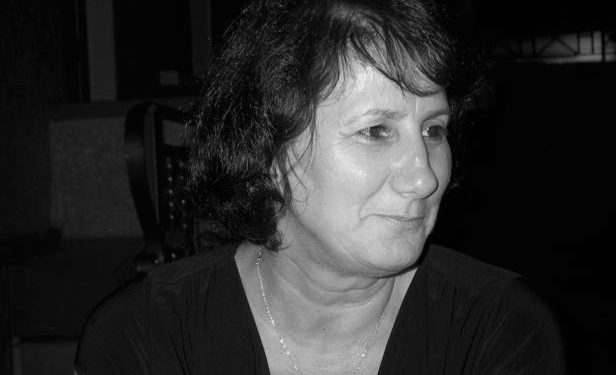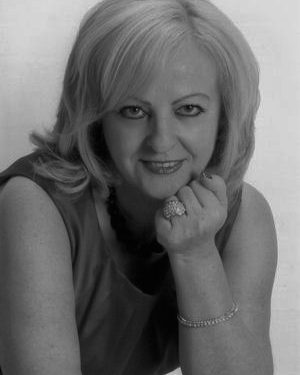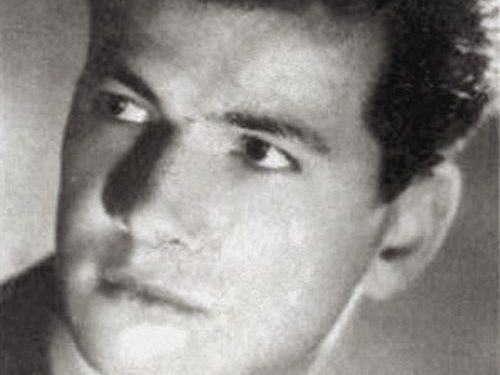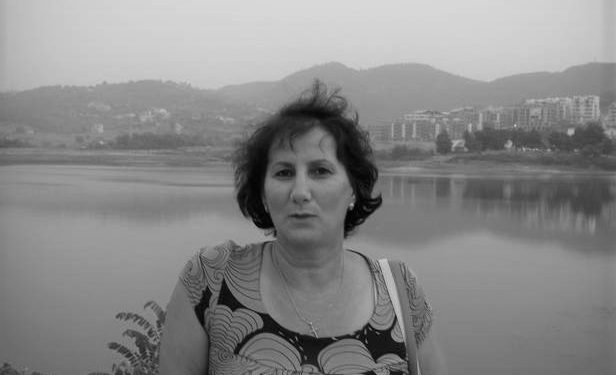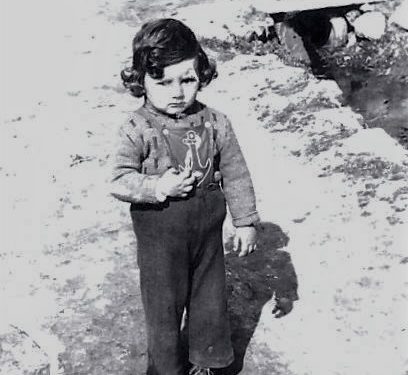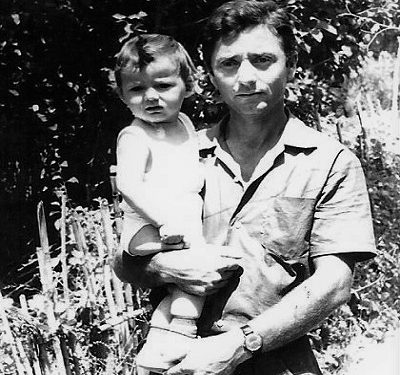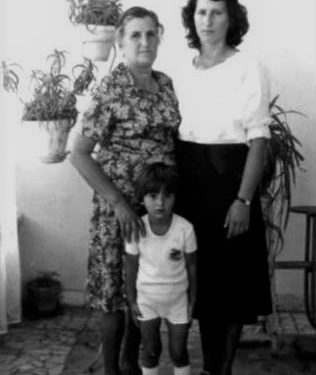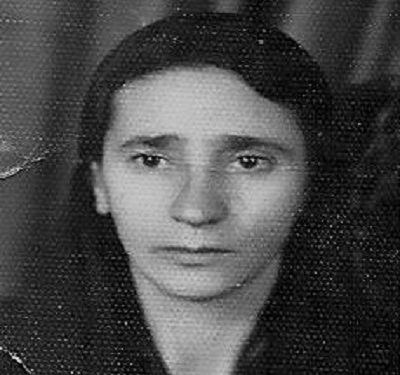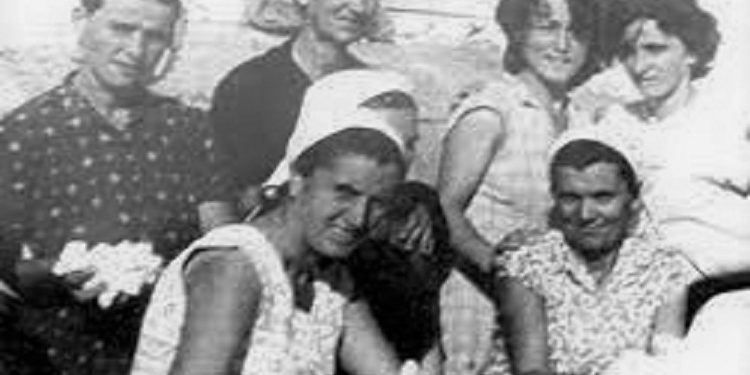By Keze Kozeta Zylo
Memorie.al / Mrs. Adriana Radi – Dine, was born in exile. Her father Dr. Lazër Radi, was a former political prisoner, exiled throughout the black time of the dictatorship, her mother, had the same fate of persecution, her husband Dine Dine, was politically imprisoned for 10 years, her father-in-law was imprisoned and shot without trial, while the entire Dine tribe was terribly persecuted and persecuted by the communist regime of Enver Hoxha and his successor, Ramiz Alia. Ms. Adriana Dine Radi was born in Lushnje on July 8, 1959, in exile and after finishing the 8-year primary school in Savër in Lushnje, in the school year 1974-1975, for biographical reasons, she was expelled from the “20 Tetori” gymnasium in the city of Lushnjes. In 1976, he married Dine Dine and in the years 1976-1990, he worked hard in agriculture, in the village of Gjaze in Lushnje. While in 1991, he left Albania and settled in New York City. Adriana has two children, a son and a daughter; Ervin and Suela. From a boy born in exile, when he came to America, Ervini graduated from one of the most prestigious schools, the Faculty of Political Sciences at Columbia University. Currently, Mrs. Adriana Dine Radi lives and works in New York City.
– Mrs. Adriana, can you please tell us about your childhood and how you experienced it?
– I was born in Lushnje, in July of 1959, while my parents were in the Internment Camp in Cerme, Lushnje. At that time, my father, Dr. Lazër Radi had just been transferred from the Kuç i Kurveleshi internment camp to the Çerma camp. They were first settled in Gradishte, then in Çerme, and after two years of stay there, they were transferred to another Internment Camp, in Savra, where they were settled at the beginning of 1960. In Savar, I completed primary school and 8 – year, then I continued high school in Lushnje, but before finishing the first year, I was expelled.
I worked for more than a year, as an agricultural worker, until in 1975, I married Dine Dine, who came from a well-known Dibran nationalist family. In 1980, we had a child who was not yet a year old, when I experienced the arrest and imprisonment of my husband, for political reasons, with 10 years of imprisonment. (Agitation and propaganda). After a year, out of despair for my son, my mother-in-law also died, leaving me with my son, who was not yet two years old. In this difficult situation, I was able to survive only thanks to my parents and my husband’s cousins, who were always by my side, in the most difficult times of my life…
– You were born in exile, in Savër, after you were condemned by the brutal communist dictatorship, what are some of the most difficult moments of your life there?
– Until the age of 31, my whole life was spent in three internment camps, in Myzeqe: in Çerma, 1959-1960; in that of Savra, 1960-1975, and that of Gjaza, 1975-1990. Camps, where all of us, the generation of children born to convicted and imprisoned parents, suffered unjustly and followed their tragic fate. I also had the luck to “walk” through many difficult prisons, such as Spaçi, Qafë-Bari, Zejmeni and the “Dinamo” Complex Camp, where my husband, who was forced to serve his political sentence.
It is enough to read some of my confessions from this period (which I have presented written on the site www.radiandradi.com) where I reflect, of course, with simplicity and sincerity as a woman and mother, only a very small part, of the sufferings of infinite mine. But, to create a more complete idea, I’m mentioning a few other things: I was a child and I couldn’t understand many things, our parents had tried with flesh and soul, so that we wouldn’t feel that world wild where we lived…! So, after I finished the 8th year, I thought I should be happy among my peers, in the new school that I was able to enroll with a thousand sacrifices. Before completing the first year of high school, a ridiculous pretext was found to exclude me and a friend of mine, who was just like me, from the biography.
I had to start working with a pick and shovel at the age of 14. After two years, I got married and settled in Gjaza. My first child died before he was 2 years old. And the son who was born to me later, Ervin, was not yet a year old, when my husband was imprisoned…! A year later, the only person I was close to, my mother-in-law, died. So, alone, in a concentration camp, with a baby in my arms, when I was no more than 21 years old…! And so, I can continue endlessly, as it is sad to say, but I do not find any moment that can be called a moment of happiness in my life.
– You are the daughter of Dr. Lazar Radit, a prominent intellectual of the Nation, what have you learned from your father and how will you preserve the wealth and cultural heritage that your father left you?
– I have had my father as a moral support and point of reference throughout my life. I have learned everything from him, from the simplest to the great deprivations of our family. For me, he was not only a parent and a family, but also a school, a book, faith, and hope. His advice strengthened my will, revived my hope, how I could succeed in the face of any kind of difficulty, be dignified, in the face of vicissitudes and sufferings, no matter how they presented themselves to me. I don’t know if I would have made it, without his inspiring figure and without that life of his, next to my life?!
Even though we were materially poor, like the vast majority of the Albanian people, having such a father by our side, we felt rich spiritually, and we were able to benefit even in those conditions of isolation, enough from the world culture that was transmitted to us daily by him . Like me and my brothers, Jozefi and Luciano Radi, we were connected after our father’s creativity, and the three of us together are trying to make public all those many manuscripts, like; essays, poems, journalism, translations, etc., which my father did not have time to bring to light and which we will soon have ready for publication…!
– In a word, to be the only daughter of Lazar Rad, for me it was a great luck and privilege…! He has shared all his pains with me, without ever complaining that he was doing too much or something special. Then to be in his confidence, is something that my words are too poor to prove properly…! I feel proud every time his name is mentioned… and it never happened to me that a person who knew him said anything but deep respect for him…!
– Your brother Jozef Radi is a talented poet and an excellent essayist, how have your children been inspired by your brother and father, as well-known writers, among many readers?
– The truth is that my children were still small when we were forced to leave Albania. Growing up, under the influence of their father, Dines, from time to time, they also browse the works of their grandfather and uncle.
Of course, they are inspired, but I believe that they also feel proud of their achievements and try not to fall behind, as far as possible. Without forgetting that today, they live in other realities and with other interests…!
– When your father Dr. Radi, it was the 100th anniversary of his birth, how did you feel, as his daughter, that the state and various cultural institutions were silent about his work?!
– The state and the cultural institutions are still silent about the values of the colossi of Albanian art and literature, which they labeled as; “reactionaries”.
I would be surprised if they had acted differently with my father…! – But we, as children, are making all the efforts, that his work, his work, his value, one day will be appreciated. My father always said: “Evil can never be, eternal”!
– What can you tell us about your late mother, who came from a noble family and, like your father, was persecuted just as fiercely?
– Eh, what can I really say about my mother?! A 20-year-old woman, after her husband was sentenced to thirty years in prison, and after a year her first child dies, at the age of 24, she is punished and persecuted, just like her husband…?! Living through unspeakable horrors…!
What I can say is that she followed her husband everywhere faithfully, until death, raising three children, in conditions of camps and suffering, and sharing not only difficult days, but also countless sacrifices.
That woman was an extraordinary support, for that extraordinary man, who was my father…! Even if only this I have shown, it is enough to prove its value…! And after all, she was a simple woman, and a pious mother, like few…!
– You have an exemplary husband by your side, Dine Dinen, grandson of the former Minister of the Interior and former Prime Minister of Albania…! I read that his father was killed, and he was exiled as a child, and then imprisoned…! What can you tell us about his difficult life?!
– My husband comes from a well-known nationalist, Dibran family. Son of a bird officer, Esat Dine and grandson of former prime minister Fiqiri Dine, he experienced all the consequences of a difficult life, which unfortunately, he knew as a child. His father was imprisoned and tortured to death and finally, for political reasons, he was killed without trial by the forces of the communist regime.
The uncle, Fiqiriu, escaped from Albania and emigrated to Greece and then to Belgium, where he died, while his entire tribe was persecuted for almost half a century. Dinia, since childhood, knew the horrors of the extermination camps of Turan, Tepelena, Porto-Palermo, Savra and finally Gjaza. He was arrested and sentenced for agitation and propaganda, with ten years of imprisonment, which he served in Spaçi, Zejmeni (Lezhë) and Qafë-Bari prisons.
During the period in emigration to America, he has continuously published writings of a journalistic nature, essays, literary criticism, translations and stories experienced in the communist hell. He has in his manuscript “Memories”, where he describes all his sufferings, ours and that of many of his co-sufferers, in the communist camps and prisons.
– What is the reaction and perception of your now grown children, about your life being so difficult and extremely discriminatory?
– Especially the boy, who was older when we lived in Albania, late, very late, has shown us shocking episodes, where it is clear the discrimination that was done to the children of the declassified. Having graduated from the Faculty of Political Science at ‘Columbia University’, he is interested in knowing everything that happens today in his country, and he feels very revolted, about what happened once, but more about what continues to happen. even to this day, in this so-called “democracy”.
– If you saw your persecutors in different environments, what would you say to them?
– They don’t deserve to be talked to, because they have nothing human…! And if I were to tell you something, it would be: “At least, you should have apologized…”!
– What is your opinion about the opening of crime files by the dictatorship?
– The files should have been opened a long time ago, but even today, it is never too late to open them. We would have been freed from many complex anxieties that are taking our breath away. If this were done, everything could change radically.
– When did you come to America and what was the path to reach the Free World?
– This is a long story. I just want to point out that a decisive role was played by my husband’s first cousin, the late Hiqmet Dine, who spared nothing to hasten our arrival in the Free World. We remain eternally grateful.
– What are some of the main impressions of your life as a woman in America?
– We cannot say that we hoped to find paradise. We have worked hard and we continue to work, but I can only say one thing: for capable and responsible people, America is the best country in the world, where everyone can find their own way, without feeling any kind of discrimination.
– How do you see the role of women in the Diaspora and the Albanian community, for the national issue?
– The role of women in the Diaspora and that of the Albanian community for the national issue, are a very precious value for Albania and Albanians, wherever they are. Regarding the woman in particular, let me give you a compliment: You are one of the activists, where everyone could take you as an example. I appreciate your input!
– In the USA, there is a significant Albanian community of young people… how integrated do you see this community in American life?
– Maybe it is a peculiarity of young Albanians, but I see them quite integrated, with American life, as much as I see them connected with life within their community. Something that also happens with my children!
– What unfulfilled dreams does Adriana have?
– My only wish was to continue school, denied in my country, but this was impossible because I had to work to support my family and educate my children. This dream never came true!
– You have been selected as a character in the book “Albanian Ladies of New York”, devised by “Albanian Excellency”, a book that will be published for the first time, about successful women across the ocean, how do you feel about this?
– My biggest dream has been the happiness of the children. Today I feel happy, that my fatigue was not in vain, at least I fulfilled that dream with my children, which I could not realize for myself, in my country! They graduated from high schools and today they walk independently. I am glad that you consider me a woman of accomplishment. Thank you!
– What do you think should be the image of the Albanian woman in the 21st century?
– In addition to her natural mission, the well-being of the family, I have no doubt that the Albanian woman, with her intelligence, will be present in every field of life, in art and culture, business and even politics…! I believe in the values and abilities of the Albanian woman… because I believed in myself! Memorie.al
New York, 2016




